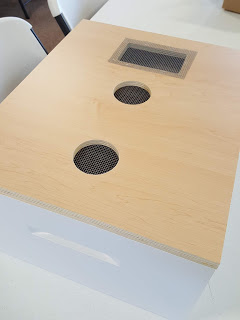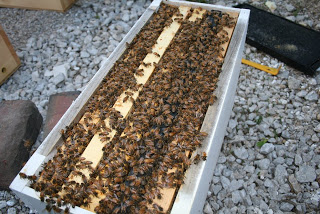Oh No! Winter Is Returning – Batten Down The Hatches
We are David and Sheri Burns at Long Lane Honey Bee Farms
Batten Down The Hatches is a nautical term referring to preparing a ship for rough waters. Here in Illinois we’ve had a mild winter, but in just a day or two, 5″ of snow is predicted and below zero chill factors at night. Many struggling colonies will not make it through this cold snap. Will it be your hives that perish? We had placed liquid feed on a few hives, but now we are taking them off and placing the Winter-Bee-Kinds back on. Wrap any questionable hives, if they are small or in a very windy spot.
Remove any liquid feeders and go back to winter-bee-kinds if this cold weather will be in your area. This raises an interesting thought. Why are bees dying?
Why Are Bees Dying?
A firm foundation in how to manage honey bees will greatly increase your colony’s chances of survival. Below, I’ll give several mistakes beekeepers make and I’ll provide solutions and suggestions how you can have a more successful year.
The Bee Informed Partnership publishes their national survey results showing the percentage of colonies that die each year. From April 2018-April 2019 40.7 percent of colonies in the US died.
It’s not just in the winter. During the summer 2018 season (1 April 2018 – 1 October 2018), an estimated 20.5% of colonies were lost. This is alarming, that out of 100 beekeepers, 20 will lose their hives between April and October before winter arrives.
Why?
Most beekeepers admit they make a mistake. They readily admit they fail to monitor their queen’s laying pattern, or they fail to monitor and control varroa destructor. Many tell me they never learned how to identify eggs or find their queen. Some blame farm spray or a bad winter.
It’s easier to blame chemical sprayers or the weather, rather than truly dive in and learn the management skills of keeping a colony alive and well throughout the year. Let’s face it, our colonies need the best we can offer to keep them strong, healthy and alive.
Beekeepers losing nearly 50% of their colonies is unacceptable. It is my opinion that IF beekeepers were better educated and understood beekeeping more thoroughly, the number of colony losses could be greatly reduced.
Beekeeping should be fun, enjoyable and rewarding. However, many new beekeepers jump into beekeeping believing it is easy and requires very little effort on their part. As an EAS Certified Master Beekeeper, I speak with beekeepers throughout the country on a weekly bases. These conversations have led me to believe that most beekeepers could have much better success if they were more informed. This is actually good news, because this can be easily resolved. Beekeepers or prospective beekeepers should commit to taking a serious beekeeping course. By serious, I mean, not a YouTube video or a 1 hour presentation on honey bees. You need a solid instructor who can guide you through the challenges awaiting you.
1. Mistake #1 No Mentor
A well trained and knowledgeable mentor can be a tremendous help to you. They should have several years of successful beekeeping under their belt. They also have to be willing to be available when you need them. This is not always the case. If you do not have a mentor, consider becoming a Member of BeeTeam6.
This month, I’m presenting my material known as, „Hive Insight Is 20/20″, providing you with videos and articles on how to get past your beekeeping limitations and advance into truly understanding how to best manage and succeed in beekeeping in 20/20.
For less than $5 a week, you will receive information, videos and access to me personally at any time. You can email, text or call me when you are unsure about your bees.
We have several openings and now would be a great time to join heading into spring and going through my material, „Hive Insight Is 20/20″.
2. Mistake #2 Not Feeding Your Bees.
Keep Your Bees Healthy With The BURNS BEES FEEDING SYSTEM
No matter how well your bees come out of winter you MUST feed your bees to ensure a healthy start to 2020. Start feeding early as soon as bees start flying regularly. We invented and designed our feeder and they sell out every year. Order your feeder early. It is a great way to feed new packages, nucs or overwintered hives coming out of winter. Click here for more info: Burns Bees Feeding System.
What Our Video Below On This Feeding System For Spring And Fall Feeding
3. Mistake #3 Lack of Knowledge & Education
Keep Your Bees Healthy By Reducing Mistakes, Blunders, Errors, Oversights and Slipups By Taking One Of Our Courses
Spring is only 37 days away. There is still time for you to get caught up on what you need to know. Your bees deserve the best you can offer.
Without a proper education in beekeeping, you may not be equipped to test and control mites every 30 days. You may not understand the best treatments for mites. By taking a course, you learn how to find the queen, how to evaluate her performance and what to do if she is failing. You learn how to identify a hungry hive and when and how to feed your bees correctly. You’ll learn the power of reading a hive, knowing and accessing it with every inspection and what actions to take to put it back on the correct course.
If you want to take a face to face course in our training center located 40 miles East of Champaign, Illinois we have 3 spots open in our March 7th Beginners Course. This is on a Saturday from 1pm-6pm central time. Click Here To Grab The Last Few Seats! This course is taught by EAS Certified Master Beekeeper, David Burns.
What if your bees survive winter but you make mistakes in the spring? Do you know how to make splits and when? Can you prevent a swarm? Should you feed in the spring and how and what mixture? Take our Spring Management Course
Do You Live Too Far Away For An Onsite Course?
Take The Same Classes Online
From The Comfort Of Your Home
On Your Own Schedule – Save On Travel
EAS Certified Master Beekeeper highly recommends you take his Ultimate Beekeeping Course. This is all of his ONLINE BEEKEEPING COURSES COMBINED
These are video courses taught by EAS Certified Master Beekeeper, David Burns
- BEGINNING BEEKEEPING
- SPRING: SURVIVAL, SUPERING, SWARMS & SPLITS
- ADVANCE BEEKEEPING
- QUEEN REARING FOR FUN OR PROFIT
- DAY IN THE APIARY
- WINTER: GETTING BEES THROUGH THE WINTER
Enjoy from your smartphone, Internet TV, Computer, or Tablet. Once you purchase this course, it is yours to enjoy forever at your own pace, in private, from the comfort of your home.
„Hi, I’m EAS Certified Master Beekeeper, David Burns. Join me in this online course and Receive the training and knowledge you need to increase your chances of keeping your bees alive. Once completed, I will personally send you a certificate of completion of your studies, suitable for framing.”
Nucs & Packages
We still have several packages available when purchased with our hive kits such as the one above. However, we are sold out of just single individual packages. We do have a few 5 frame Nucs available. Click here for more info on our locally raised 5 frame Nucs.
Here’s our newest hive kit with package of bees! (BEES ARE PICK UP AT OUR CENTER IN FAIRMOUNT IL) One deep hive with 10 frames and foundation, 1 med super with 10 frames and foundations, premium inner cover, metal covered top cover, one entrance reducer, and FREE ENTRANCE FEEDER (although we think you’ll want to switch to the 3 Season Burns Bees feeding system). Foundation colors vary.Great for the beginner to add more boxes to, or as a gift for the hobbyist in your life who wants to get started in beekeeping. Click Here To Order Now!
Źródło: Oh No! Winter Is Returning – Batten Down The Hatches





